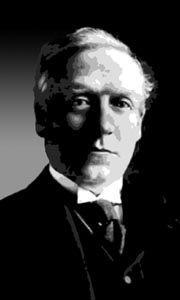 |
 |
|||
|
|
A graduate of Balliol
College, Oxford, Asquith became a member of Parliament in 1886. He served in
Campbell-Bannerman's government (1906) as home secretary and chancellor of
the Exchequer. He also served in his cabinet and succeeded him as prime
minister in 1908.
Asquith's ministry was turbulent to say the least. When
the Lords rejected the Liberals budget in 1909 it led to open conflict
between the two houses of parliament that resulted in the Parliament Act of
1911 shifting the balance of legislative power from the Lords to the
Commons, preventing the Lords from rejecting public legislation. That bill
was passed by the Lords due to threats by the Liberals to pack the Lords
with Liberal peers to carry the legislation. He also was confronted
industrial problems, challenges from suffragettes and the potential for the
smouldering question of Irish home rule to ignite civil war. Notable
legislative achievements included passage of the National Insurance Act
(1911) which provided insurance covering unemployment and illness.
Asquith lead a coalition government following the
outbreak of World War I, but was ousted by Lloyd George, another Liberal,
who had secured the backing of Conservatives to win election in December,
1916. The Lloyd George election caused a split in the Liberal Party, which
has to be considered one of the reasons for its decline during the period
between World War I and World War II. Asquith remained party leader until
1926, when he retired to Sutton
Courtenay in Berkshire. Reproduced by kind permission of Britannia.com.
|
|||
| © Nash Ford Publishing 2003. All Rights Reserved. | ||||



 Herbert
Henry Asquith (1852-1928)
Herbert
Henry Asquith (1852-1928)